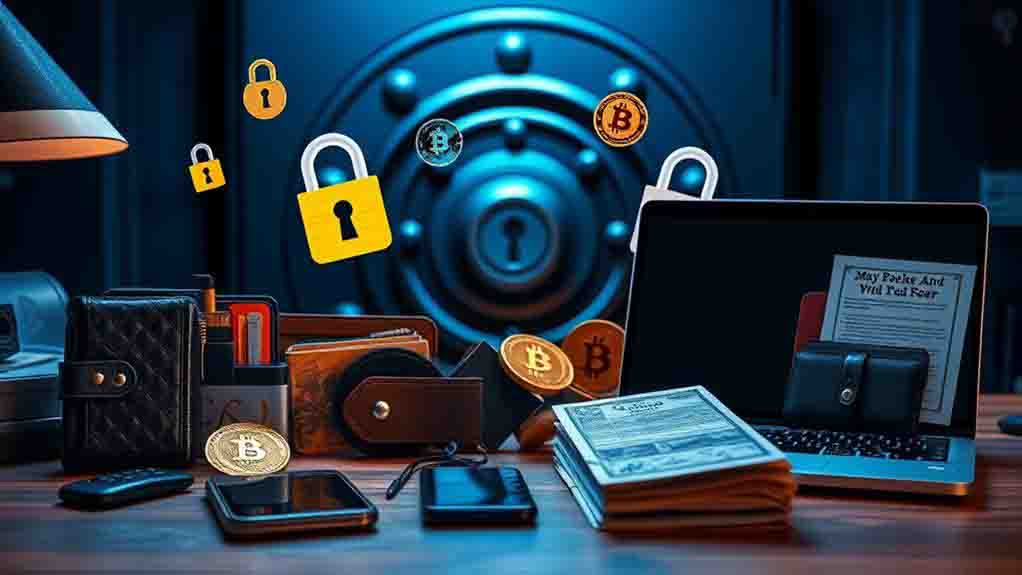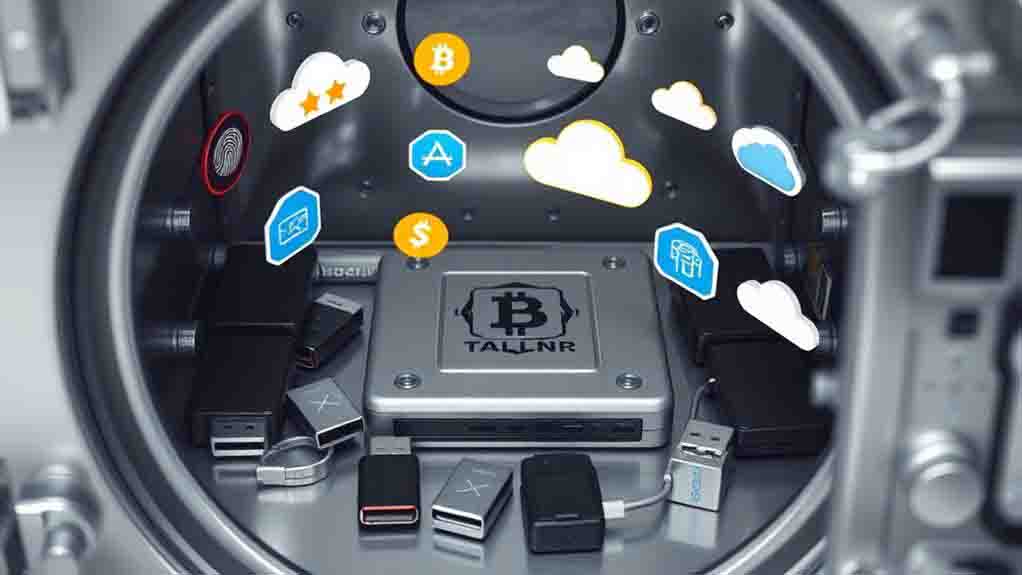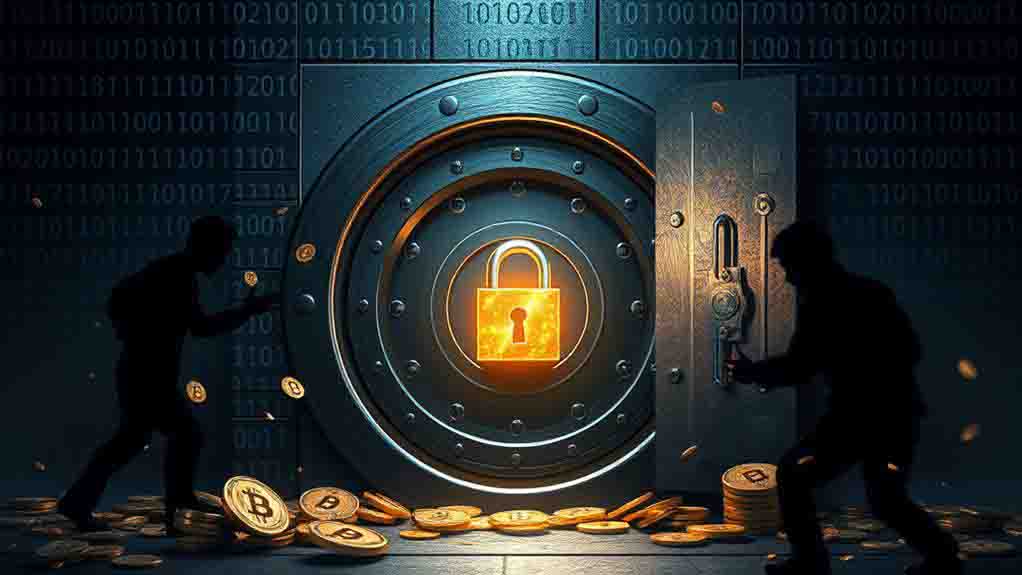What Are the Best Ways to Secure Crypto?
Note: This post may contain affiliate links, and we may earn a commission (with No additional cost for you) if you make a purchase via our link. See our disclosure for more info. The crypto world is constantly changing. This content is for informational purposes only and not financial, legal, or professional advice So, please verify the info on the cryptocurrency provider’s websites.
Click below and listen to the crypto podcast about this page.
As you enter the world of cryptocurrency, security is paramount. As digital assets grow more valuable, they attract cybercriminals. So, we must protect them with strong measures. You've likely heard horror stories of hacks and lost fortunes, but don't let that deter you. A multi-layered approach to crypto security can greatly reduce risks. It will help with owning digital assets. From cold storage to multi-factor authentication, many strategies are at your disposal. But which ones are truly essential, and how can you implement them effectively?
Key Takeaways
- Use cold storage solutions like hardware wallets to keep private keys offline and secure from online threats.
- Implement multi-factor authentication on all cryptocurrency accounts to prevent unauthorized access.
- Regularly update wallet software and security measures to protect against the latest vulnerabilities.
- Diversify storage methods, using a combination of hot wallets for transactions and cold wallets for long-term holdings.
- Be vigilant about recognizing and avoiding common crypto scams, including phishing attempts and fake wallet applications.
Cold Storage Solutions
When it comes to securing your cryptocurrency, cold storage solutions offer the highest level of protection. These methods involve keeping your private keys offline, minimizing exposure to online threats and potential hacking attempts.
Two popular cold storage options are hardware wallets and paper wallets, each providing unique security benefits for long-term cryptocurrency holdings.
Hardware wallets, such as Trezor and Ledger, are specialized devices that utilize secure elements and encryption to protect your private keys. These wallets are resistant to hacking attempts and malware, making them an excellent choice for storing significant amounts of cryptocurrency.
Paper wallets, on the other hand, involve generating a public and private key pair offline and printing them on paper. While this method is cost-effective, it requires careful storage to prevent physical damage or theft.
To enhance security further, consider implementing multi-signature wallets in your cold storage setup. This approach requires multiple keys for transactions, adding an extra layer of protection against unauthorized access.
Regardless of the cold storage solution you choose, it's essential to regularly back up your devices and securely store recovery phrases. This precaution helps prevent irreversible loss of cryptocurrency in case of device failure or loss.
Multi-Factor Authentication
Three key factors make Multi-Factor Authentication (MFA) an essential security measure for protecting your cryptocurrency assets.
First, it greatly enhances security by requiring multiple verification factors.
Second, it drastically reduces the likelihood of unauthorized access.
Third, it's a critical component recommended by security experts for safeguarding digital assets.
To implement MFA effectively for your cryptocurrency exchanges and wallets:
- Enable MFA on all your accounts related to crypto transactions
- Use hardware security keys, like Yubikey, for the strongest protection against phishing
- Opt for authentication apps such as Google Authenticator or Authy over SMS-based methods
- Regularly review and update your MFA settings to guarantee continued protection

Secure Password Management
In light of the ever-present threats to digital assets, secure password management stands as an indispensable defense for cryptocurrency holders. To protect your digital wealth, it's vital to implement strong passwords and unique credentials for each of your accounts, especially cryptocurrency exchanges. Use a reputable password manager like 1Password or Dashlane to generate and store complex passwords that are at least 16 characters long.
Regularly check for exposed passwords using services like haveibeenpwned.com/Passwords to verify your credentials haven't been compromised. Update your passwords frequently, particularly for sensitive accounts. Implement two-factor authentication (2FA) wherever possible, using authentication apps or hardware security keys for enhanced security.
| Password Best Practices | Benefits |
|---|---|
| Use unique passwords | Limits breach impact |
| 16+ character length | Increases complexity |
| Regular updates | Reduces vulnerability |
| Implement 2FA | Adds security layer |
Regular Software Updates
Regular software updates are vital for maintaining the security of your cryptocurrency holdings.
You should enable automatic update features on your wallet and exchange platforms to guarantee you're always protected against the latest threats.
Before installing any update, it's imperative to verify its authenticity by downloading directly from official sources, reducing the risk of falling victim to malicious software masquerading as legitimate updates.
Patch Critical Security Vulnerabilities
Security holes can leave your crypto assets vulnerable to theft, making regular software updates essential for protecting your investments.
Cybersecurity experts estimate that 60% of breaches could be prevented through timely software updates and patch management. By keeping your wallet software, exchange applications, and operating systems up to date, you minimize the risk of malware infections and unauthorized access to your funds.
To effectively patch critical security vulnerabilities and secure your crypto:
- Enable automatic updates for your cryptocurrency applications and operating systems.
- Regularly review and update security software to maintain a robust defense against evolving cyber threats.
- Prioritize updates for wallet software and exchange applications to address newly discovered exploits.
- Set reminders to manually check for updates if automatic updates aren't available.
Enable Automatic Update Features
Vigilance in keeping your crypto-related software up to date is essential for maintaining robust security. Enabling automatic updates for your wallets and exchange platforms guarantees you're always protected against the latest threats. This feature applies vital security patches and bug fixes without requiring manual intervention, greatly reducing your vulnerability to potential attacks.
To maximize your crypto assets' protection:
- Set your wallet software to update automatically
- Enable automatic updates for exchange platforms
- Keep your device's operating system current
- Maintain up-to-date antivirus software
By implementing these measures, you're fortifying your defenses against malware and other cyber threats that could compromise your digital assets.
Remember, hackers often exploit known vulnerabilities in outdated software, making regular updates vital for safeguarding your investments.
If automatic updates aren't available for your chosen wallet or exchange, make it a habit to check for updates frequently. Many providers release updates on a regular basis to address emerging security concerns.
Verify Update Authenticity
With the constant evolution of cyber threats, verifying the authenticity of software updates is vital for maintaining robust crypto security. Outdated versions of wallet software can leave your digital assets vulnerable to exploits, making regular updates fundamental.
However, it's equally important to guarantee these updates come from legitimate sources to avoid introducing malicious code into your system.
To verify update authenticity and protect your crypto assets:
- Always download updates directly from official sources or the developer's website
- Check digital signatures and hashes provided by developers to confirm file integrity
- Enable automatic updates when available to guarantee you're running the latest security patches
- Review change logs and version histories to understand recent security improvements
For hardware wallet users, firmware updates offer significant security enhancements while maintaining offline protection.
These updates can improve functionality and address potential vulnerabilities, further safeguarding your assets.

Diversifying Wallet Types
Cryptocurrency's security landscape demands a multi-faceted approach to wallet management. To enhance your digital security, you'll want to diversify your wallet types.
Start by utilizing a combination of hot wallets and cold wallets. Hot wallets, connected to the internet, are ideal for immediate transactions, while cold wallets provide offline storage for long-term holdings, minimizing exposure to online threats.
Consider incorporating hardware wallets, such as Trezor or Ledger, which offer a secure option for storing private keys offline. These devices are resistant to online hacking attempts, adding an extra layer of protection to your crypto assets.
For an additional secure option, create paper wallets as offline backups, but remember to safeguard them against physical damage or theft.
To further enhance security, explore multi-signature wallets. These require multiple private keys to authorize transactions, distributing control among trusted parties and considerably reducing the risk of unauthorized access.
Educating Yourself on Threats
To protect your crypto assets, you'll need to familiarize yourself with common scams targeting cryptocurrency users.
Understanding how to recognize phishing attempts, such as fake websites or unsolicited emails requesting sensitive information, is essential for maintaining your digital security.
Common Crypto Scams
Vigilance is key when maneuvering the crypto landscape, as scammers constantly devise new ways to exploit unsuspecting investors. To secure your cryptocurrency and protect yourself from scams, it's essential to understand common threats.
Here are four prevalent crypto scams you should be aware of:
- Phishing attacks: Scammers create fake websites mimicking legitimate crypto exchanges to steal your login credentials. Always verify URLs before entering sensitive information.
- Fake wallets: Fraudulent wallet applications often resemble legitimate software. Only download wallets from official sources to protect your assets.
- Ponzi schemes: Be wary of promises of unrealistic returns on investments, as these are often scams designed to lure victims into depositing funds.
- Pump and dump schemes: Scammers artificially inflate the price of low-volume cryptocurrencies through misleading promotions, causing unsuspecting investors to buy in before the price crashes.
To safeguard your crypto assets, use reputable exchanges, store your cryptocurrency in a secure cold storage device, and conduct thorough research before investing.
Recognizing Phishing Attempts
Recognizing phishing attempts is a critical skill for anyone involved in the cryptocurrency space. These fraudulent attacks often come in the form of emails or messages that appear to be from legitimate sources, aiming to trick you into revealing sensitive information or clicking on malicious links.
To protect your cryptocurrency assets, it's vital to develop a keen eye for these scams.
Key points to remember when recognizing phishing attempts:
- Always verify the sender's email address and URL before engaging with any communication.
- Be wary of unsolicited messages requesting personal information or account verification.
- Look for HTTPS encryption and double-check URLs when visiting cryptocurrency-related websites.
- Stay informed about the latest phishing techniques in the crypto space.
Phishing attacks account for approximately 90% of data breaches, highlighting the importance of vigilance. Scammers often use enticing offers or threatening messages to create a sense of urgency, hoping to bypass your security awareness.

Implementing Backup Strategies
Implementing robust backup strategies is essential for safeguarding your cryptocurrency assets. To protect your digital wealth, you should regularly back up your wallet data and store it in multiple secure locations.
Consider using encrypted USB drives or cloud storage with strong passwords to prevent loss due to device failure or accidental deletion. Utilize recovery phrases by securely writing them down and storing them in fireproof safes or safety deposit boxes, guaranteeing they're accessible only to you or trusted individuals.
Hardware wallets offer an additional layer of security by allowing you to back up your private keys as a physical copy. This provides a secure method of recovery in case of loss or theft.
To further enhance your security, use password managers to generate and securely store complex passwords for your wallets and exchanges, reducing the risk of unauthorized access.
To maintain the effectiveness of your backup strategies:
- Regularly update your backup methods
- Review your backup storage locations
- Confirm backups remain secure and accessible
- Consider using multiple backup methods for redundancy
Utilizing Hardware Security Keys
A crucial step in fortifying your cryptocurrency security is the use of hardware security keys. These physical devices provide an additional layer of protection for your digital assets by implementing two-factor authentication (2FA) during login attempts.
Unlike SMS or app-based 2FA methods, hardware security keys are resistant to phishing attacks, making them an excellent choice for safeguarding your crypto accounts.
Hardware security keys, such as Yubikey and Google Titan, are compatible with many major cryptocurrency exchanges, including Coinbase and Kraken. They use the Universal 2nd Factor (U2F) standard, allowing you to authenticate with a simple button press.
This ease of use doesn't compromise security; instead, it enhances it by requiring physical access to the device.
To maximize the benefits of hardware security keys:
- Store them in a secure location to prevent loss or theft
- Set up backup recovery options in case you misplace your key
- Regularly update the firmware to protect against emerging vulnerabilities
Minimizing Online Exposure
To minimize your online exposure and protect your cryptocurrency holdings, it's essential to limit your social media presence regarding your investments.
You should carefully review your online accounts, removing any sensitive information that could make you a target for thieves or scammers.
Additionally, always use secure communication channels when discussing your crypto assets, such as encrypted messaging apps or official support channels provided by reputable exchanges.
Limit Social Media Presence
Your online presence can be a double-edged sword when it comes to cryptocurrency security. While social media platforms can be valuable for staying informed about the crypto market, they can also expose you to potential risks.
To limit your social media presence and protect your crypto assets, consider the following steps:
- Restrict discussions about your cryptocurrency holdings on social media platforms.
- Regularly audit your online profiles and remove unnecessary personal information.
- Be cautious when sharing details about your crypto investments to avoid attracting unwanted attention.
- Adjust privacy settings on your social media accounts to limit post visibility to trusted contacts only.
Use Secure Communication Channels
Secure communication channels play an essential role in protecting your cryptocurrency assets beyond limiting your social media presence. To safeguard your digital wealth, you should use secure communication channels when discussing sensitive information related to your crypto holdings or transactions.
Encrypted messaging apps like Signal or WhatsApp offer a secure way to communicate about cryptocurrency matters. These apps protect your conversations from eavesdropping and unauthorized access, reducing the risk of your information falling into the wrong hands.
Additionally, avoid discussing your crypto activities on public forums or social media platforms, as this can make you a target for phishing attacks and scams.
Implement secure email practices by using encrypted email services such as ProtonMail for crypto-related communications. This extra layer of protection helps guarantee that your sensitive information remains confidential.
Be wary of unsolicited communications and always verify the legitimacy of requests for information. Use official channels, such as contacting support directly through the service's website, to confirm the authenticity of any inquiries.

Verifying Transactions Carefully
Vigilance is key when conducting cryptocurrency transactions. To guarantee the security of your digital assets, it's vital to verify transaction details meticulously before sending crypto.
Always double-check the recipient's wallet address, as even a small error can result in irreversible loss of funds. Use a QR code scanner when possible to minimize manual entry mistakes. Before confirming any transfer, carefully review the transaction amount and network fees to verify they align with your intentions.
To further safeguard your crypto assets, follow these essential steps:
- Confirm the transaction status using a reputable blockchain explorer
- Access your wallet only through the official website to avoid phishing attempts
- Use secure cold storage solutions for long-term holding of significant amounts
- Enable two-factor authentication on all your crypto-related accounts
Frequently Asked Questions
What Is the Best Way to Secure Cryptocurrency?
To best secure your cryptocurrency, you'll want to employ multiple strategies.
Use cold wallets, like hardware devices, for long-term storage, keeping your assets offline and safe from online threats.
Implement two-factor authentication on all your crypto accounts and wallets for added protection.
Create strong, unique passwords and update them regularly.
Avoid storing large amounts on exchanges; instead, transfer to personal wallets.
How Can I Make My Cryptocurrency Safer?
To make your cryptocurrency safer, you should implement several key security measures.
First, enable two-factor authentication on all your crypto accounts, preferably using hardware security keys.
Next, use strong, unique passwords and consider a password manager for secure storage.
Keep your wallet software updated regularly.
Store most of your crypto in cold wallets, which aren't connected to the internet.
What Is the Most Secure Crypto System?
The most secure crypto system combines multiple layers of protection.
You'll want to use a cold wallet, like a hardware wallet, for long-term storage. Implement multi-signature functionality to require multiple keys for transactions.
Don't forget to enable two-factor authentication on all your accounts. Regularly update your wallet software and security measures.
When trading, choose reputable exchanges with strong security features, including insurance against hacks.
What Is the Most Secure Platform for Cryptocurrency?
When considering the most secure platform for cryptocurrency, you'll find that several exchanges offer robust security measures.
Coinbase, Kraken, Crypto.com, Gemini, and Binance are among the top contenders. Each provides features like two-factor authentication, insurance policies, and cold storage for assets.
However, Gemini's regulation by the NYDFS and extensive security framework give it a slight edge.
Ultimately, the most secure platform depends on your specific needs and risk tolerance. Always research thoroughly and implement additional security measures on your end.
Conclusion
You've learned about various methods to secure your cryptocurrency. Using cold storage, multi-factor authentication, and regular software updates will protect your assets. Don't forget to diversify your wallet types and maintain thorough backup strategies. Remember, securing your crypto isn't a one-time task. It's an ongoing process that needs ongoing vigilance and education. To protect your digital wealth, stay aware of threats. Verify transactions carefully. Also, limit your online exposure.










